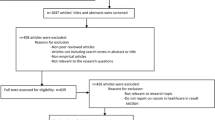Abstract
Healthcare collectives, such as patient organizations, advocacy groups, disability organizations, professional associations, industry advocates, social movements, and health consumer organizations have been increasingly involved in healthcare policymaking. Such collectives are based on the idea that individual interests can be aggregated into collective interests by participation, deliberation, and representation. The topic of collectivity in healthcare, more specifically collective representation, has only rarely been addressed in (Western) bioethics. This symposium, entitled: “Collective Representation in Healthcare Policy” of the Journal of Bioethical Inquiry draws attention to this understudied topic from a variety of disciplines, within a variety of socio-cultural contexts. We draw attention to important ethical, cultural, and social questions, and into the practices, justifications for, and implications of collective representation of patients in healthcare policy.
Similar content being viewed by others
References
Baggott, R. and K.L. Jones. 2018. Representing whom? U.K. health consumer and patients’ organizations in the policy process. Journal of Bioethical Inquiry 15(3). https://doi.org/10.1007/s11673-018-9859-4
Beier, K, I. Jordan, C. Wiesemann, and S. Schicktanz. 2016. Understanding Collective Agency in Bioethics. Medicine Health Care and Philosophy 19(3): 411–22.
Blease, C., and K.J. Geraghty. 2018. Are ME/CFS patient organizations “militant”? Patient protest in a medical controversy. Journal of Bioethical Inquiry 15(3). https://doi.org/10.1007/s11673-018-9866-5
van de Bovenkamp, H.M., and H. Vollaard. 2018. Representative claims in healthcare: Identifying the variety in patient representation. Journal of Bioethical Inquiry 15(3). https://doi.org/10.1007/s11673-018-9861-x
Dryzek, J.S., 2000. Deliberative democracy and beyond. New York: Oxford University Press.
Dumas, A. 1982. The three musketeers. New York: Penguin Classics.
Epstein, S. 2008. Patient groups and health movements. In The handbook of science and technology studies, edited by E. Hackett, O. Amsterdamska, M. Lynch, W.J. Cambridge, 499–439. Cambridge: MIT Press.
----. 2011. Measuring success: Scientific, institutional and cultural effects of patient advocacy. In Patients as policy actors, edited by B. Hoffman, 257–277. Rutgers University Press.
Hutchison, K., W. Rogers, and V.A. Entwistle. 2017. Addressing deficits and injustices: The potential epistemic contributions of patients to research. Health Care Analysis 25(4): 386–403.
Gerhards, H., K. Jongsma, and S. Schicktanz. 2017. The relevance of different trust models for representation in patient organizations: Conceptual considerations. BMC Health Services Research 17(1): 474.
Luce, J. 2018. Mitochondrial replacement techniques: Examining collective representation in emerging technologies governance. Journal of Bioethical Inquiry 15(3). https://doi.org/10.1007/s11673-018-9873-6
Pitkin, H.F. 1967. The concept of representation. Berkeley: University of California Press.
Pugh, J. 2018. Navigating individual and collective interests in medical ethics. Journal of Medical Ethics 44(1): 1–2.
Rojatz, D., J. Fischer, and H.M. van de Bovenkamp. 2018. Legislating patient representation: A comparison between Austrian and German regulations on self-help organizations as patient representatives. Journal of Bioethical Inquiry 15(3). https://doi.org/10.1007/s11673-018-9864-7
Schicktanz, S. 2015. The ethical legitimacy of patient organizations’ involvement in politics and knowledge production: Epistemic justice as a conceptual basis. In The public shaping of medical research: Patient associations, health movements and biomedicine, edited by. P. Wehling, W. Viehover, and S. Koenen, 246–264. London, U.K.: Routledge.
Schicktanz, S., N. Rimon-Zarfaty, A. Raz, and K. Jongsma. 2018. Patient representation and advocacy for Alzheimer disease in Germany and Israel: The relevance of stigma and disease conception. Journal of Bioethical Inquiry 15(3). https://doi.org/10.1007/s11673-018-9871-8
Acknowledgements
The guest editors collaborate on a project on collective representation by the State of Lower Saxony, Hannover, Germany, grant 11,762,519,917/14 (ZN3010).
Author information
Authors and Affiliations
Corresponding author
Rights and permissions
About this article
Cite this article
Jongsma, K., Rimon-Zarfaty, N., Raz, A. et al. One For All, All For One? Collective Representation in Healthcare Policy. Bioethical Inquiry 15, 337–340 (2018). https://doi.org/10.1007/s11673-018-9870-9
Published:
Issue Date:
DOI: https://doi.org/10.1007/s11673-018-9870-9



